|
June 30, 2020 - No. 45
Stepped Up Neo-Liberal
Assaults on Education
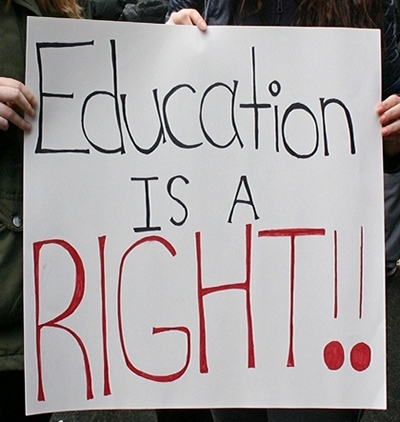 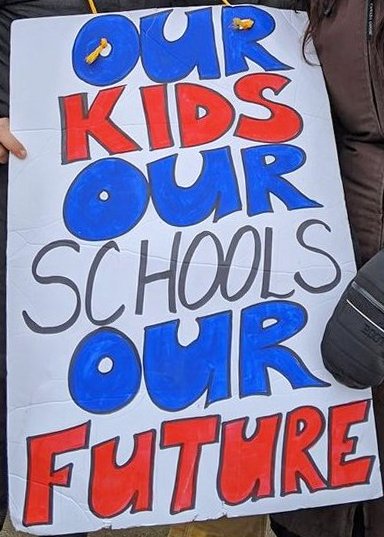 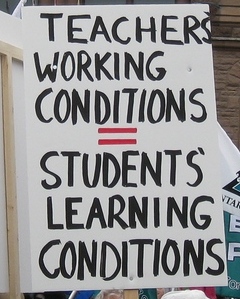
Stepped Up Neo-Liberal Assaults on
Education
• Alberta Minister
of Education Extends Government Dictate Over
Local School Boards - Kevan Hunter
• Dismantling Alberta's
Post-Secondary Education System With Help from
McKinsey & Company - Dougal MacDonald
• Performance-Based
Indicators: Another Zombie Idea -
George Allen
• Challenges in
Ontario's Post-Secondary Education -
Steve Rutchinski
• Situation in Higher
Education in Ontario - Interview,
Colleen Burke
Stepped Up Neo-Liberal Assaults
on Education
- Kevan Hunter -
Following a review by multinational business
advisory firm Grant Thornton LLP, Alberta's
Minister of Education Adriana LaGrange issued a
Ministerial Order regarding the operations of
the Calgary Board of Education (CBE), on May 21.
The order gives 19 conditions the Board must
meet by November 30, or the Minister will
dissolve the elected school board and appoint
trustees who will obediently submit to the
government's dictate.
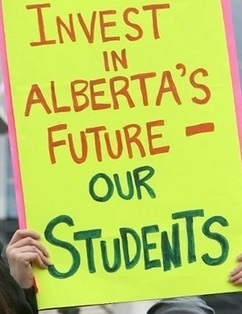 The review was
ordered by the Minister of Education in November
2019 to punish the CBE for speaking out publicly
about the consequences of the government's cuts
to education funding. While the CBE ultimately
was permitted to dip into their infrastructure
and maintenance funds to keep staff this year,
the board had expected to cut 300 teaching
positions in the middle of the school year based
on the budget released by the Alberta
government. The review was
ordered by the Minister of Education in November
2019 to punish the CBE for speaking out publicly
about the consequences of the government's cuts
to education funding. While the CBE ultimately
was permitted to dip into their infrastructure
and maintenance funds to keep staff this year,
the board had expected to cut 300 teaching
positions in the middle of the school year based
on the budget released by the Alberta
government.
In targeting the Calgary Board of Education
with these measures, the Minister of Education
is also sending a message to all other school
boards in the province about how the government
will operate and that they should fall into line
or face the consequences.
What is happening in public education in
Calgary is of concern to all Canadians as it
illustrates how the anti-social offensive is
being waged by the ruling circles to undermine
public education and expand the space for
privatization and further wrecking of the public
system.
Grant Thornton's mandate from the government
was to look at "Governance and Financial Cost
Management" with a focus on items such as
"program delivery costing" and "specific cost
centres" which include, among other things,
"staffing levels and related compensation."
Grant Thornton positions itself as an adviser to
municipal governments and other public levels of
government on "financial sustainability," which
in plain English means advising governments on
which cuts to make.
The review is in the service of the takeover of
public education by private interests. The
starting point is not that all children living
in Alberta have a right to education, and that
we need to work out how to guarantee that right.
Rather, the outlook is that funding for
education is a burden and a drain on society and
other sectors of the economy.
The report itself presents a series of
observations about what are considered positive
and negative features of the CBE's finances. On
the negative side is the fact that the CBE
signed a long-term lease for their headquarters
before oil prices crashed, and is consequently
paying much more than current market rate. On
the positive side, according to Grant Thornton
LLP, the "CBE is currently on the higher end of
efficiencies as compared to other school
jurisdictions with respect to custodial staffing
costs." The CBE even boasts that each full-time
caretaker is assigned 2,361 square metres to
clean, on average. No investigation is made into
whether this is adequate or realistic even under
normal circumstances. The report does not even
recognize that in the conditions of a global
pandemic, schools cannot be safely re-opened
without a very significant increase in the level
and frequency of cleaning.
The CBE is criticized for not having sufficient
money in their operating reserves "at a time of
financial uncertainty following the election of
a new government." In other words, the
government can set education funding at whatever
amount it wants, has no social responsibility to
ensure funding commensurate with the needs of
students, teachers and education workers, and it
is the CBE who is at fault for not being
prepared to cope. The CBE should have
anticipated a famine and put everyone on a diet
in preparation.
The report summarizes its findings as follows:
"Overall, the findings are indicative of an
organization that has undergone turmoil at the
governance level with a focus on process over
function and a short-term view of financial
sustainability. This said, at the operational
level of financial management we found many
examples of strong financial processes and
controls along with some areas for which we have
provided recommendations for improvement."
The Minister has cherry-picked from the report
to paint the desired picture of a failing public
institution that has lost its way and needs
government intervention to get back on track.
Words from the report are twisted to make them
sound more critical of the CBE than they
actually are.
As CBE has supposedly "become focused on
internal process related matters and policy
interpretation rather than the strategic matters
at hand," the solution is to make various
amendments to operational expectation policies,
to have a governance instructor approved by the
Minister, and to improve its risk management
program.
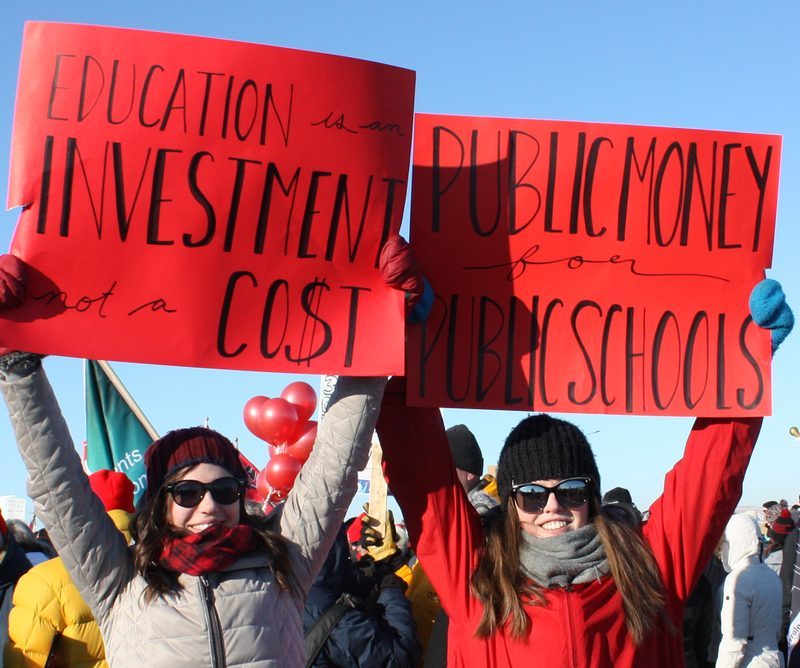 The business
jargon is enough to make one's head spin, but
one element leaps out: risk management. The
conditions needed for students to thrive and
teachers and education workers to meet those
needs and to defend their rights are seen as a
liability to the rich because it reduces the
amount of social reproduced value (wealth) that
they can expropriate and claim as private
profit. For the rich, the education system is
the source of the workers they need with the
specific skills they require. Private interests
also demand control over everything from
building schools (public-private partnerships),
to planning curriculum, and in higher education
over research. The business
jargon is enough to make one's head spin, but
one element leaps out: risk management. The
conditions needed for students to thrive and
teachers and education workers to meet those
needs and to defend their rights are seen as a
liability to the rich because it reduces the
amount of social reproduced value (wealth) that
they can expropriate and claim as private
profit. For the rich, the education system is
the source of the workers they need with the
specific skills they require. Private interests
also demand control over everything from
building schools (public-private partnerships),
to planning curriculum, and in higher education
over research.
We need to provide the right to education with
a guarantee because society needs enlightened
teachers, education workers, schools, colleges
and universities to help raise our children and
open a path forward for the progress of society.
We need an education system which recognizes
that guaranteeing this right means that the
needs of all students must be looked after, and
the relevant programming provided. In
particular, Indigenous children, kids whose
first language is not English or French,
and kids with special needs must all be provided
with what they need to thrive.
The Kenney government has a different agenda.
Its aim is to serve the private interests of
those in control of the economy who make up the
financial oligarchy, and in Alberta the energy
oligarchs and their financiers in particular.
Whatever does not serve this need is
dispensable.
Among other things, Minister LaGrange has
directed the CBE to "establish performance
measures, which can be used to determine the
quality of programs and the information needed
to monitor the educational and cost
effectiveness of supplementary programs."
What is being implied is that the CBE needs to
refocus on its "core business" of educating
students in the regular school setting. Within
the Calgary public school system, there are a
number of alternative programs, such as
immersion programs, arts-centred learning,
science-focused education, classes for pregnant
students and new mothers, and outreach programs
for at-risk students who are not successful in
traditional schools. These programs often come
with additional expenditures related to
transporting students over longer distances or,
in some cases with students in need, maintaining
smaller class sizes.
Narrowing the scope of public education aligns
with the objectives of Bill 15, the Choice in
Education Act, which was passed by the
Alberta legislature on June 24. Bill 15 further
centralizes the process for approval of charter
schools in the hands of the Education Minister,
and expands the criteria on which charter
schools can be approved. The bill also removes
the requirement that the public school board be
invited to run an alternative program before it
can be established as a charter school. It is
also consistent with the United Conservative
Party policy of "equitable per-student funding
in accordance with school choice." Alberta
already funds private schools at 70 per cent of
the public system, and Kenney has made it clear
he favours expansion of both private and charter
schools. Forcing the CBE to refocus on its "core
business" rather than its "supplementary
programs," can serve to eliminate programs which
do not serve the needs of the financial
oligarchy, such as outreach schools. The most
vulnerable students would be abandoned in the
process, but this does not appear to be a big
concern for the Minister of Education or the
Alberta government.
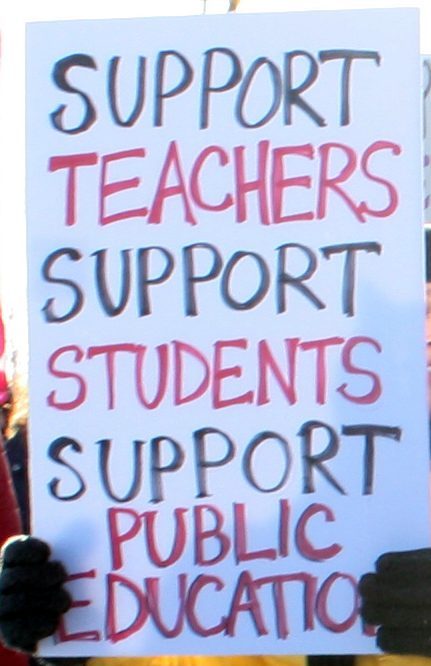 The CBE is
directed to "support classrooms in a more direct
way (i.e. more "regular" teachers and fewer
specialists, leaders, administration, etc).
Rededicating resources to the "front lines" has
become a mantra in the context of the
anti-social offensive. It distorts the reality,
which is that most teachers who are designated
leaders are teaching full time or nearly full
time, and that the few specialists who exist
also provide vital services needed by students
and teachers. The CBE is
directed to "support classrooms in a more direct
way (i.e. more "regular" teachers and fewer
specialists, leaders, administration, etc).
Rededicating resources to the "front lines" has
become a mantra in the context of the
anti-social offensive. It distorts the reality,
which is that most teachers who are designated
leaders are teaching full time or nearly full
time, and that the few specialists who exist
also provide vital services needed by students
and teachers.
Other "financial management" measures include
considering eliminating all bus service to
students who live less than 2.4 kilometres from
school and raising fees for transportation.
As the organization Support Our Students points
out,
the
Education Minister's priority right now must be
how to relaunch schools safely. Schools actually
need more resources, not less, at this time.
Students are already suffering from the
arbitrary way in which the decision to close
schools and lay off many education workers was
made. The failure to consult teachers and
involve them in decision-making is doing harm to
students and the education system.
The government has failed to take up its social
responsibility to adequately fund education, and
when cracks appear in the system, it goes in for
the kill. While all eyes are focused on how to
overcome the crisis, the government has taken
the opportunity to push an agenda of
privatization. This is shameful behaviour.
Meanwhile, it is teachers and education workers
who are taking up social responsibility, in the
face of the government's failure to do so. When
schools were closed, teachers and education
workers did not wait for a voice from on high to
give them direction. They immediately went into
action to check in on the well-being of their
students and to work out together how online
learning should take place. It is with this
spirit that they will continue to defend public
education.

- Dougal MacDonald -
On June 11, Alberta Premier Jason Kenney
announced his government had signed a $3.7
million contract with McKinsey Calgary,
subsidiary of a giant global U.S. management
consulting firm, to review the province's
post-secondary education system. McKinsey &
Company or "The Firm" is the biggest management
consulting company in the world; many of its
employees have become CEOs of major corporations
or key government officials. Former McKinsey
managing partner Dominic Barton is now Canadian
Ambassador to China. Former employee Robert
Greenhill became president of the Canadian
International Development Agency (CIDA).
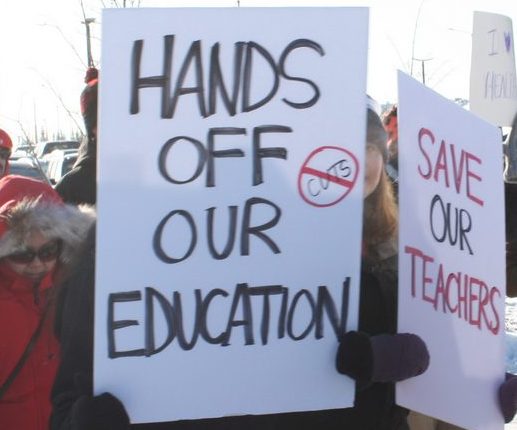 At first glance,
the United Conservative Party's (UCP) selection
of McKinsey to review post-secondary education
seems strange. According to McKinsey biographer
Duff McDonald, the company "provides strategy
and management consulting services, such as
providing advice on an acquisition, developing a
plan to restructure a sales force, creating a
new business strategy or providing advice on
downsizing." Clearly, none of these services
relate to education. However, they certainly do
not contradict the ongoing neo-liberal campaign
to defund and privatize post-secondary education
and further make it the handservant of industry. At first glance,
the United Conservative Party's (UCP) selection
of McKinsey to review post-secondary education
seems strange. According to McKinsey biographer
Duff McDonald, the company "provides strategy
and management consulting services, such as
providing advice on an acquisition, developing a
plan to restructure a sales force, creating a
new business strategy or providing advice on
downsizing." Clearly, none of these services
relate to education. However, they certainly do
not contradict the ongoing neo-liberal campaign
to defund and privatize post-secondary education
and further make it the handservant of industry.
None of the four McKinsey Calgary partners
claims expertise in post-secondary education. In
fact, three of the four state their main area of
expertise is service to the oil and gas
industry, while the other focuses on executive
coaching. How this qualifies them to review
post-secondary education is anybody's guess. But
then again, the current Minister of Advanced
Education came to his position from providing
communication consulting to the private sector.
His only post-secondary teaching experience is
in business schools, which actually do not
belong in universities since they non-critically
treat business as self-evidently good.
This is not to say that McKinsey & Company
has never produced reports on post-secondary
education. For example, in 2012, they published
Rethinking 101: A New Agenda for University
and Higher Education System Leaders. None
of the report's recommendations come as a
surprise. They just recycle the usual ramblings
of reactionary governments, for example, more
partnerships with industry, outsourcing
services, cutting employee benefits, eliminating
"non-core" activities, and consolidating
courses. The report says nothing about student
learning conditions or instructor teaching
conditions and how they can be improved. The
report treats education as a business that needs
to be run more "efficiently," which is pretty
much how McKinsey Calgary will treat Alberta
post-secondary education.
The second reason the selection of McKinsey
seems strange is that a number of companies it
has advised have subsequently experienced some
of the biggest business fails of recent decades.
They include the collapse of Enron, the fall of
drugmaker Valeant, the failure of hedge fund
Galleon, and various shady deals linked to the
Gupta brothers in South Africa. Further,
McKinsey has provided controversial
recommendations for some questionable clients,
including U.S. Immigration and Customs
Enforcement under the Trump administration,
Saudi Arabia, and U.S. drug maker Purdue Pharma.
McKinsey's advice to Purdue focused on how to
boost opioid sales. Purdue now has $12 billion
in lawsuits against it for starting and
sustaining the opioid crisis.
The UCP appears to be quite cozy with McKinsey.
On May 1, 2019, the UCP hired former McKinsey
employee David Knight Legg as chief advisor on
trade and finance. He has accompanied Kenney on
several overseas investment trips. On June 5,
UCP Minister of Advanced Education Demetrios
Nicolaides publicly cited a 2015 McKinsey report
called Youth in Transition, highlighting
conclusions that only 34 per cent of employers
and 44 per cent of students believed they were
prepared for the workforce. This fits perfectly
with the UCP agenda to more closely tie
education to providing free training for the
monopolies.
Since being elected in 2018, the UCP has
implemented a number of "reviews" to try to fool
the people of Alberta into supporting their
policies. Each time they have ensured that those
who conduct the charade will come to the UCP's
predetermined conclusions and the McKinsey
review will be no exception. Much of it will
likely be neo-liberal boiler plate. If the
review includes any real consultation with the
people of Alberta, everything that contradicts
the predetermined conclusions will be ignored.
The UCP will then brag that both the experts and
the public fully support their review and its
conclusions.
 Perhaps the most
nauseating aspect of the post-secondary
education review will be how the upper
administrators of various Alberta post-secondary
institutions will unhesitatingly welcome the
"findings," whatever they may be. This has been
the pattern so far even when the UCP cuts to
post-secondary education funding have resulted
in lost jobs, hiring freezes, cancelled
programs, increased tuition fees, discarded
libraries, and so on. Such destruction is
obsequiously accepted by top post-secondary
institution administrators accompanied by
mindless mantras like "We must adjust to the
current fiscal realities." Of course, one reason
administrators cave in to the UCP's
anti-education campaigns is that in August 2019,
the UCP replaced the existing chairs of many
post-secondary education institutions' boards of
governors with their own agents, mainly from the
energy industry. Perhaps the most
nauseating aspect of the post-secondary
education review will be how the upper
administrators of various Alberta post-secondary
institutions will unhesitatingly welcome the
"findings," whatever they may be. This has been
the pattern so far even when the UCP cuts to
post-secondary education funding have resulted
in lost jobs, hiring freezes, cancelled
programs, increased tuition fees, discarded
libraries, and so on. Such destruction is
obsequiously accepted by top post-secondary
institution administrators accompanied by
mindless mantras like "We must adjust to the
current fiscal realities." Of course, one reason
administrators cave in to the UCP's
anti-education campaigns is that in August 2019,
the UCP replaced the existing chairs of many
post-secondary education institutions' boards of
governors with their own agents, mainly from the
energy industry.
The $3.7 million UCP review implies that there
is some big mystery about what needs to be done
in regard to post-secondary education in Alberta
but there is no mystery. Just for starters, here
are four steps which many have suggested should
be taken as soon as possible. First, the right
to education must be legislated. Second, funding
to education must be greatly increased. Third,
student fees must be frozen, then decreased and
finally eliminated. Fourth, the practice of
exploiting faculty by hiring them as
"sessionals," with no job security, no benefits,
and inadequate salaries must be stopped. These
four steps alone will go a long way to
reinvigorating post-secondary education in
Alberta so that it can better do its real job,
which is contributing to the advancement of
society by serving the public interest.

- George Allen -
Like zombies rising from the grave,
performance-based indicators (PBIs) are once
again a hot topic with Alberta government
officials and post-secondary education (PSE)
administrators. On January 20, Minister of
Advanced Education Demetrios Nicolaides
announced that PBIs would be instituted in
Alberta on April 1 and would be used to
determine funding to universities, colleges, and
technical schools. On March 27, Nicolaides
retreated from his stand and said the PBIs would
be postponed to the end of May due to the
problems created by the COVID-19 pandemic but
assured everyone that the idea will soon be
reactivated.
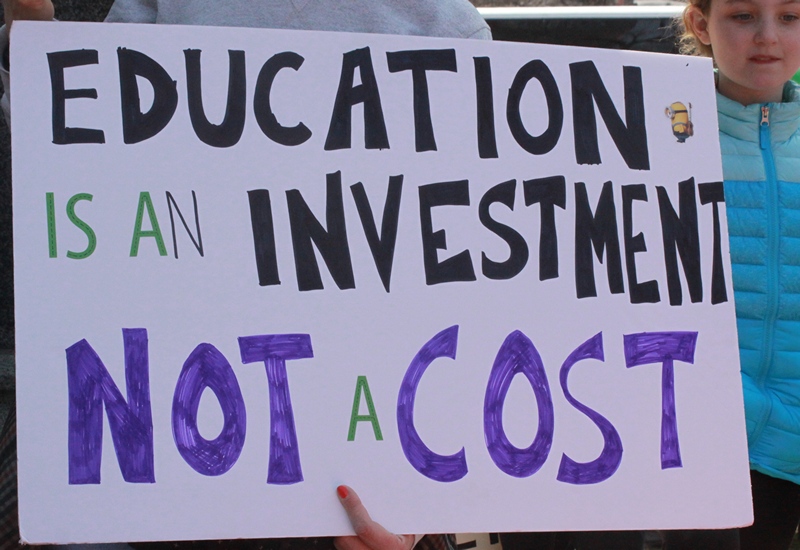 The neo-liberal
idea of PBIs, which originated in the business
world, tries to tie "costs" to the production of
a particular commodity, with the basic intention
of driving down those costs. That is why the
rise of PBIs is always accompanied by relentless
budget cuts to public education. In the field of
post-secondary education, common PBIs include
enrolments, graduation rates, and hiring rates
of graduates. But there are two things wrong
with the idea of PBIs from the get-go. First,
education is an investment, not a cost. Second,
education is not a commodity; it is a public
good which must be constantly expanded to bring
about the continuous improvement of society. The neo-liberal
idea of PBIs, which originated in the business
world, tries to tie "costs" to the production of
a particular commodity, with the basic intention
of driving down those costs. That is why the
rise of PBIs is always accompanied by relentless
budget cuts to public education. In the field of
post-secondary education, common PBIs include
enrolments, graduation rates, and hiring rates
of graduates. But there are two things wrong
with the idea of PBIs from the get-go. First,
education is an investment, not a cost. Second,
education is not a commodity; it is a public
good which must be constantly expanded to bring
about the continuous improvement of society.
PBIs have a long history but it is no accident
they first became the vogue in the
Reagan/Thatcher era, as one aspect of the
neo-liberal movement is to transform
universities into businesses, complete with the
top down structures favoured by the corporate
sector. Minor details like collegial governance
(which has now been reduced to a ritual in most
PSE institutions) and academic freedom (which is
now being attacked under various guises, such as
"incivility") were labelled as impediments to
"doing business," much like workers' rights and
environmental regulations. As Thatcher
infamously said, "There is no society; there is
only the market." So, the neo-liberal view is
that the so-called free market should govern PSE
and business managers should run the PSE
institutions with that in mind.
Historically, PBIs have reached heights of true
absurdity. This is mainly due to the endless
attempts to reduce everything to numbers. In
1980s New Zealand, the government ridiculously
proposed "costs-per-square-foot" as the true
indicator of a PSE institution's efficiency.
Other governments have suggested treating the
graduate with a degree as a "product" of the
staff, library, computer and other costs
required to produce "it." A third approach is to
tie "performance" directly to graduate hiring
rates alone, as if that is even possible in
today's gig economy when so many are part-time
workers with no security, even at the PSE
institutions themselves.
Clumsy attempts to apply the "numerical
approach" to evaluating the effectiveness of PSE
show over and over it is almost impossible to
measure what PSE institutions do or should do.
Graduation rates may be measurable. But how does
one, for example, put a number on social
contribution, critical thinking, creativity,
tolerance, problem-solving skills, leadership,
wisdom, access for marginal groups, diversity of
staff, and so on? Scholars have spent decades
trying to clarify what these things even are,
let alone how to measure them. So PBIs simply
discount these important factors. Governments
and the administrators who do their bidding, by
pushing PBIs, basically assert that what cannot
be quantified is not valuable and therefore can
be ignored. Perhaps they should listen more
closely to Einstein's famous dictum: "Not
everything that counts can be counted, and not
everything that can be counted counts."
A further point is that the items that are to
be "measured" by PBIs are often not even under
the control of the university or its staff. For
example, when a government slashes operating
budgets, the response of the university can only
be to oppose the cuts or to knuckle under and
figure out ways to eliminate staff and programs
to meet the new budget guidelines, totally
disregarding the fact that the staff are the
producers of all value. Unfortunately, the
second alternative is the one that PSE
institutions in Alberta have chosen. Not a
single PSE institution has stood up to the UCP
government's cuts or to the mandating of PBIs.
Of course, the fact that last August the UCP
replaced extant PSE institution board chairs
with their own appointees from industry has
contributed to the undermining of internal
resistance.
It is a delusion to think that PBIs will
somehow ensure "accountability" and/or produce
"excellence" in PSE. The idea is an insult to
educators, students and support staff as well as
a complete misrepresentation of the real
purposes of education. Education is not a
business, nor should it be the mere handservant
of industry. PBIs' numbers will provide no
guidance if the aim is really to improve our PSE
institutions.
However, the other point is that it is just as
possible that PBIs could produce exactly the
opposite conclusion to that of the cost-cutters.
Then they might be used to show that what
universities really need is not cuts but more
funding, legislation affirming the right to
education, more permanent faculty with benefits,
more and better equipment, and the freezing,
reduction and eventual elimination of all
student fees.

- Steve Rutchinski -
Major challenges exist throughout the
post-secondary education sector as the fall
2020-21 session approaches in the continuing
COVID-19 pandemic. The shaping of post-secondary
education over decades of retrogression and the
anti-social offensive has left the entire system
with few options: either a change of direction
in the service of advancing Canadian society or
more crisis and chaos will follow.
The Executive Director of the Canadian
Association of University Teachers (CAUT), David
Robinson, recently made the point that the
"COVID-19 pandemic has brought into sharp relief
the long-forming fault lines and fissures within
our universities and colleges. The increasing
reliance of our institutions on private
financing, the exploitation of precarious
labour, and the turn toward market-oriented
curriculum and research have left us
ill-prepared to deal with the current crisis."[1]
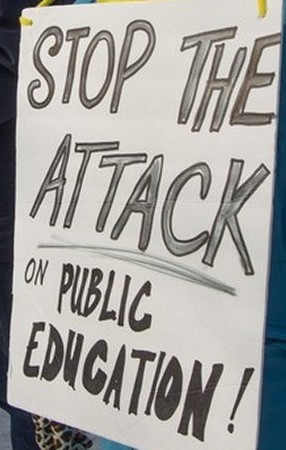 "During the past
30 years," he writes, "governments of various
political stripes have steadily shifted the
costs of post-secondary education from
collective public funding to individual private
tuition fees. The scale of this change has been
nothing short of staggering. In 1990, just over
80 per cent of university operating funding came
from government grants. As of 2018, that figure
had plummeted to about 47 per cent. "The
result," he points out, "is that our
institutions have become financially addicted to
tuition fees, including the high fees charged to
international students. Institutions that have
come to rely upon the latter to prop up their
operations face a potentially devastating
decline in those revenues if the pandemic
persists into the next academic year." "During the past
30 years," he writes, "governments of various
political stripes have steadily shifted the
costs of post-secondary education from
collective public funding to individual private
tuition fees. The scale of this change has been
nothing short of staggering. In 1990, just over
80 per cent of university operating funding came
from government grants. As of 2018, that figure
had plummeted to about 47 per cent. "The
result," he points out, "is that our
institutions have become financially addicted to
tuition fees, including the high fees charged to
international students. Institutions that have
come to rely upon the latter to prop up their
operations face a potentially devastating
decline in those revenues if the pandemic
persists into the next academic year."
There has been an 11 per cent decline in
provincial funding per full-time student between
2008 and 2018. Fully 53 per cent of university
funding now comes from tuition fees.
Universities on average rely on foreign student
tuition for 20 per cent of their revenues. In
2018 over 500,000 international students studied
in Canada, bringing in more than $6 billion in
tuition fees.[2]
Fleecing foreign students to sustain
post-secondary education is another expression
of state-organized racism in Canada, much like
the human trafficking carried out through
government-sponsored migrant worker programs,
which denies these "guest" workers Canadian
status.
Universities and colleges have been encouraged
by the federal government, especially since the
economic crisis of 2008, to solve their
financial difficulties by increasing tuition and
recruiting foreign students. While banks and the
financial oligarchs were bailed out and society
was saddled with the debt load, the cost of
post-secondary education has been increasingly
transferred onto students and their families in
the form of higher tuition and debt. It has also
resulted in much larger class sizes for students
and an explosion of precarious contract teaching
for faculty.
Most in the post-secondary education sector --
from students to faculty to administrative,
maintenance, service and cleaning staff are
concerned about the prospect of yet another
round of cuts to funding for public education by
various levels of government once the COVID-19
emergency response spending comes to an end.
According to University Affairs online
magazine, Manitoba and Alberta have instructed
higher education institutions to develop
scenarios for cuts of up to 30 per cent and in
this direction some universities are already
making non-academic staff redundant for the near
term.[3]
Universities across the country appear to be
making their plans with little, if any, input
from the members of the academic community. The
Ontario Confederation of University Faculty
Associations (OCUFA) objected to this situation
in a recent consultation held with the Ministry
of Colleges and Universities Advisory Council,
under the auspices of the Ontario Jobs and
Recovery Committee. The OCUFA brief reports,
"Since March academic staff have been devoted to
getting through the term while taking the best
possible care of their families and communities.
On campus, members have undergone an overnight
shift to Emergency Remote Teaching (ERT)," which
was defined by university administrations as a
temporary move, a shift which created a myriad
of challenges for faculty.
OCUFA continues: "It appears that remote
teaching arrangements are not likely to be as
temporary as we all hoped. While some research
and campus operations may resume by the start of
the fall semester, most universities have
formally announced that the bulk of the fall
term will be remote ... It is also expected
that, where physical distancing is possible,
some research projects will also resume on
campus. This reliance on ERT is creating new
challenges and exacerbating some of the tensions
faculty experienced in the initial move to
remote teaching. Adding to this tension is the
fact that most universities only consulted
faculty superficially or not at all about these
looming challenges. If we are going to succeed
in delivering post-secondary education through
this pandemic, it is imperative that collegial
governance and the collective bargaining rights
of faculty be respected."[4]
Students, faculty and staff -- those most
affected by the conditions at post-secondary
institutions -- have essentially been
marginalized, with no say over the safety or
quality of their working and learning
conditions. It cannot be allowed to continue
that others make decisions that can adversely
affect their lives while the only role they have
is to react after the fact. The academic
community must continue to raise their voices
and take pro-active stands in determining their
working and learning conditions and the very
direction of post-secondary education itself.
Notes
1. "Imagining Education
after the Pandemic" by David Robinson, CAUT
Bulletin, May-June 2020.
2. Containing the Impact
of COVID-19 on Higher Education by Michael A.
O'Neill, policyoptions.irpp.org.
3. Michael A. O'Neill, ibid.
4. "COVID-19 and the
Academy," OCUFA policy brief.

- Interview, Colleen Burke -

Post-secondary students rally in Toronto,
January 18, 2020, against Ford government's cuts
to education funding.
Workers' Forum spoke with Colleen Burke,
President of USW Local 1998 about what is
going on at U of T and in
higher education settings in general. The
administrative and technical staff at the
University of Toronto, represented by United
Steelworkers Local 1998,
are staff who keep higher education running.
Senior management at U of
T and throughout higher education, are quick
to say "thank you for all
you do," but are arrogantly deciding what
"back-to-work" protocols will
be, while workers are given no say whatsoever
and left to be reactive
to management decrees.
Workers' Forum: Let's start with
a brief introduction.
Colleen Burke: Sure. I am
President of USW
Local 1998. We represent over 8,000 members --
administrative and
technical staff at the University of Toronto,
Victoria University,
University of St. Michael's College and U of T
School.
Our members have been working from home since
about
March 20. The university is still functioning.
While most buildings are
closed, there are a few exceptions such as
residence buildings, health
services for those on campus, and so forth.
It’s
been a huge transition to get everybody working from home and of course
there are laboratory technicians, food service people and others who
aren’t working because their work cannot be done from home. U of
T did guarantee pay continuity up to April 30 even for those who could
not work from home. A lot of contracts ran to April 30. Then there are
those employed in summer kids camps or hired for eight weeks of
convocation employment and so forth. We also have about 3,000
– 3,500 casuals and the University also extended guaranteed pay
continuity to our casual members as well. That was great.
We've seen temporary layoffs too in a few
departments.
About 70 full-time people were given 13-week
layoffs. They will qualify
for the Canada Emergency Response Benefit and
again, the university is
stepping up with an additional $1,000 per month
and paying both
portions of their medical benefits.
WF: What have been the main
issues the union and your membership are dealing
with?
CB: Before the closure many were
worried
and wanted to work from home but they were
prevented from doing so in
most cases. It wasn't until the province
declared an emergency that
working from home got solved. Up to that time we
were very busy with
health and safety issues. Even now we are
dealing with health and
safety concerns of members providing services to
students on campus, in
residences, health services for students, IT
people etc. For people
working from home, child care is a big issue.
Managers are leaning on
staff working and parenting from home.
Officially, the university
position is that managers should be flexible but
still some managers
are
very harassing of our members. Our members are
also worried about
layoffs. Some departments are ordering people to
take vacation time.
The union agreed as a way to mitigate layoffs.
WF: Is there talk about how you
will transition to return to work?
CB: The health and safety plan for return
to work is a big issue for the union. The University put out a roadmap
statement on return to work. Our Joint Health and Safety Committees
were never included in sorting out the health plan. The University
retains that as a management prerogative. It is the same with protocols
for return to work. It is bound to result in all kinds of complaints
after the fact. We have a full time H&S officer but it is not going
to be easy. USW 1998 is engaging with other unions and others on campus
to work out appropriate protocols for return to work in the various
work settings. This is how it is happening across board for all
post-secondary institutions I think.
USW Local 1998 is working within the University
of
Toronto Employees Associations and Unions
(UTEAU), an informal umbrella
group of student unions, labour unions and
faculty associations on all
three campuses of the University. We are working
on a common document
about our values, aspirations etc. in light of
COVID-19, to identify
our immediate demands of the university and more
long-term demands of
the province. Universities are underfunded as
is, and the worry is what
will happen after the immediate crisis is over?
Daycare is going to be another serious issue.
About 70
per cent of our membership are women. Women are
carrying and will carry the
brunt of this problem. I know of one member who
had to go on stress
leave because working from home while parenting
was too much. Some
people shorten the work week by sprinkling in
vacation time. Others may
opt for part-time, if possible, because it is
too much without child
care.
How are people even going to get to and from
work
safely? People are justifiably concerned about
taking the transit. Who
is responsible for looking out for people's
health on public transit?
As things start up, it is going to be a very
serious concern.
WF: Is there anything else you
would like to share with our readers?
CB: We are all very concerned
about the
financial impact of the COVID-19 pandemic.
Everyone in post-secondary
is looking to what will happen in September. How
many students will
show up? How many international students will
come? The reality here is
that international students are seen as a cash
cow. International
student tuition accounts for about 20 per cent
of U of T tuition
revenue. How many will still pay through the
nose for an online
education experience, i.e. not in-class
instruction.
There have been no federal funding
announcements of
support for post-secondary education. We want to
see funding support to
get through the impact of this pandemic. I know
students want to see
tuition cuts as well and I support that. But
post-secondary education
itself is going to have huge problems without
additional funding. And
when
we come out of this are we going to see another
round of austerity
measures?
This year, 2020, is a collective bargaining
year at the
University of Toronto and all post-secondary
workers are negotiating
under the one per cent
austerity measures imposed under Bill 124.
Oddly, since the pandemic
set in, that now just looks to be one among many
problems we have to
deal with.

(To access articles
individually click on the black headline.)
PDF
PREVIOUS
ISSUES | HOME
Website: www.cpcml.ca
Email: office@cpcml.ca
|

